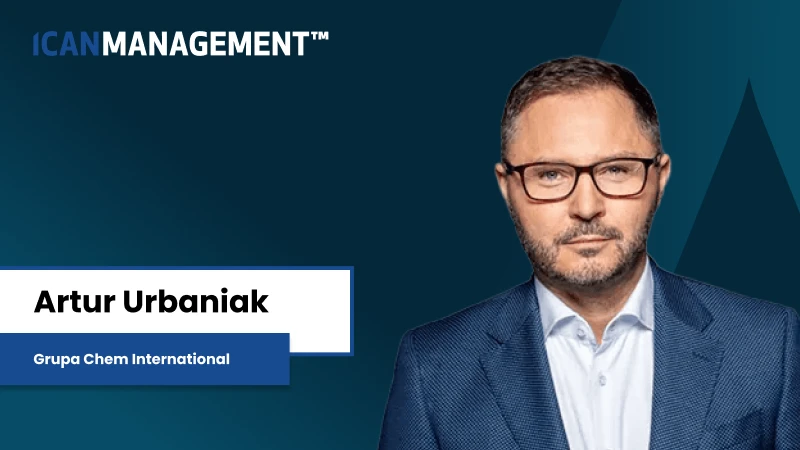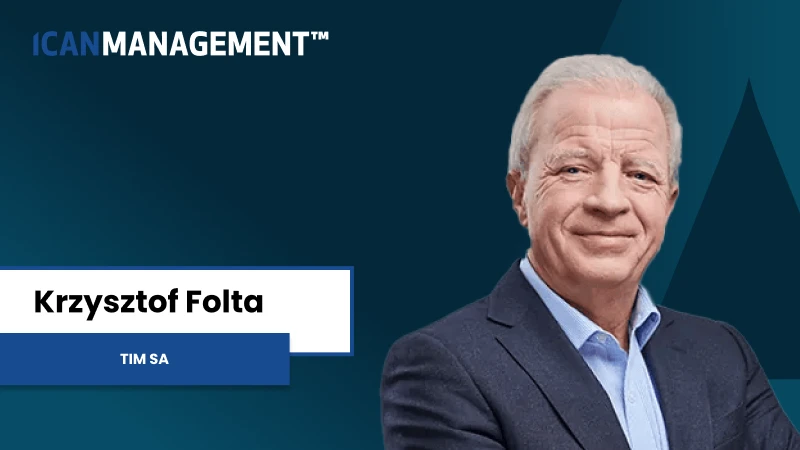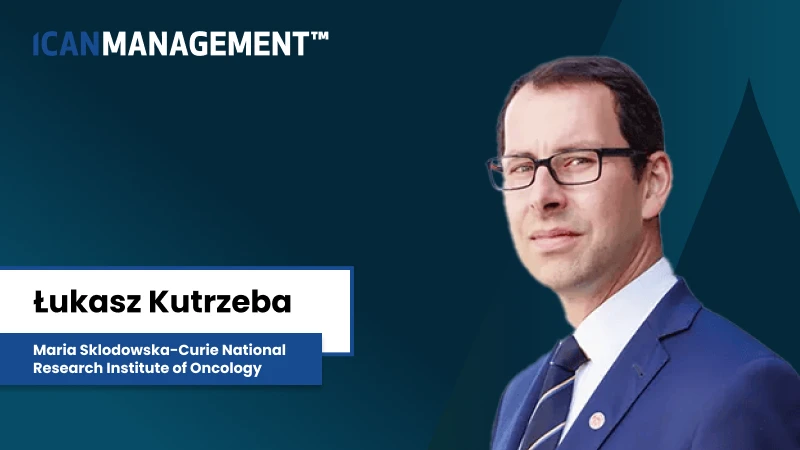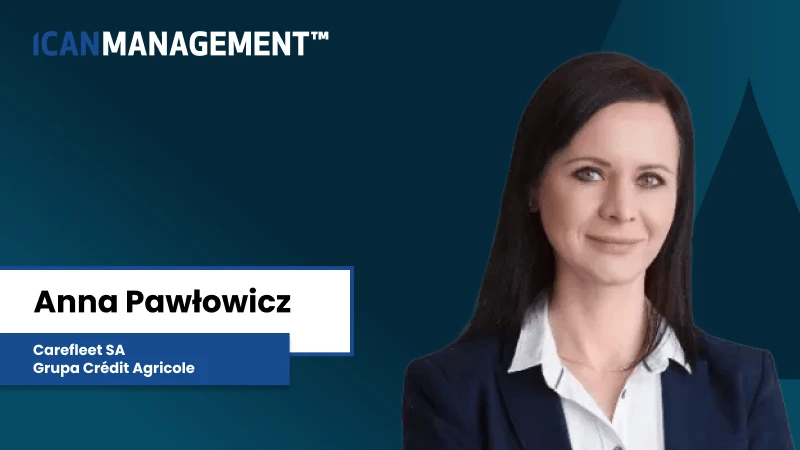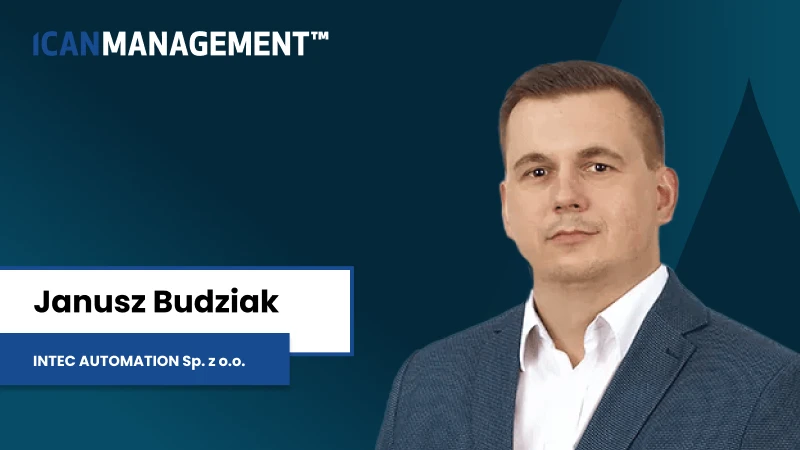A practical alternative to an MBA - achieve mastery in managing your company, your team and your own performance.
AI & MIT
MIT Sloan
Management Review
Poland

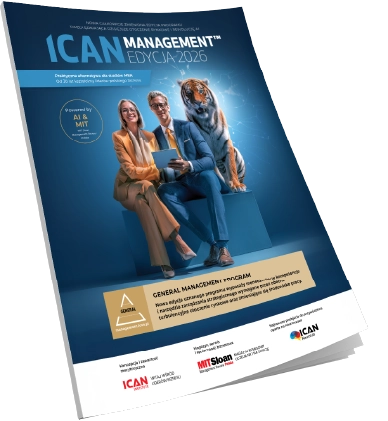
Managing a piece of the company is not enough. Organizations need holistic leaders.
Today, the success of companies is determined by leaders who can look more broadly - through the lens of the entire business, combine different perspectives and operate effectively in a complex, uncertain and digital environment.
The program shows how to look at organizational development in a holistic way, integrating different business functions: leadership, strategy, sales and communication. The latest edition has been enhanced with AI topics and additional sessions. It will allow you to develop the key managerial skills needed to manage your company, your team and your own performance.
Training tailored 100% to your and your organization's needs? It's possible! Let's talk about preparing a Management™ training course in a dedicated version for companies.
Contact us
Become a manager ready for the AI revolution
Watch the video to see how ICAN Management™ will prepare you for the challenges of the artificial intelligence era.
See what's new in the ICAN Management™ program
Each edition of the program is updated for current managerial challenges and enhanced with new exercises, materials and tools.
Now 13 sessions combining classroom and online.
Discussing progress and meeting graduates.
Expanded to include the latest trends and management methods.
Concrete application examples and tools for implementing AI.
Examples from the world of business, art and history.
MIT's global knowledge for program participants
As the only strategic partner of MIT in Poland, we provide access to content created by scientists and practitioners from this legendary university. As a program participant, you will be able to benefit from them!
Download the brochure Book a consultationDid you know that.

Graduates received higher earnings after completing training

Participants reported increased effectiveness in team management and goal achievement

managers believe that the tools they have learned have allowed them to make their organizations more effective
Benefits of training for managers
The entire company will benefit from the development of the manager's competence, which will positively affect your business performance.
Who ICAN Management™ training is for
During the program you will meet managers of similar seniority, with whom you will exchange valuable experiences and business contacts.
For leaders who want to grow their companies using the most advanced management methods.
For managers of individual departments, promoted to management or facing such a prospect.
For business executives who are seeking formal management education (regardless of age).
For graduates of academic business programs who found they needed more practical management tools.
Stories of leaders who have succeeded with ICAN
Read what participants have achieved by attending ICAN Management™ and what they value the training for.
What sets ICAN Management™ apart from other training courses
See for yourself which is the better choice if you care about practical development and real results.
MBA studies
Prestigious, but long, expensive and often too theoretical.

ICAN Management™
It is shorter and more flexible in its formulation.
Typical training
They focus on only one area (e.g. HR, sales, finance).

ICAN Management™
Allows you to look at the company holistically and integrate different business functions
Short courses
Often in an online version. Flexible, but lacking in interaction.

ICAN Management™
It emphasizes group work, simulations and feedback.
Thinking about an MBA? Check out the alternative
Is an MBA the only right path for managers? Find out why you should choose ICAN Management™.
ICAN Management™ is updated on a regular basis. Each edition is enriched with real-world leadership challenges. MBAs, on the other hand, are rarely updated (the average life span of a program is 11-13 years).
Interactivity of classesOn our program, you will work on your challenges through exercises and simulations. An MBA, on the other hand, is generally academic in nature, and classes are purely theoretical or textbook-type examples are presented.
Program hostSessions at ICAN Management™ are taught by business practitioners who work with companies on a daily basis. On the other hand, at the college, they are taught by people who have never owned a business or managed people.
See what you will learn and what competencies you will gain.
Strategic thinking and management: a new model (online)
The opening session of the program introduces participants to the logic of adaptive management, based on early observation of trends and weak signals. We show how to move away from linear plans to approaches that combine data analysis, rapid experimentation, iteration and action learning. You will also learn how to use AI not only as an analytical tool, but also as a support for interpreting complex processes.
Competencies developed at the session:- Analysis of the environment and changes
- Strategic thinking in complexity
- Using AI in trend analysis
- Flexible scheduling
- Flexible scheduling
Strategy as a set of integrated choices - in the age of AI
In this session, you'll work on key challenges - where to play and how to win - broken down into decisions about customers, products and competitive fundamentals. We discuss the most common strategic dilemmas and how to solve them based on data and scenario analysis. You'll learn about the concept of "open strategy," which emphasizes the role of managers at various levels in creating strategy. You will also learn how AI supports the analysis, simulation and testing of the effects of different choices.
Competencies developed at the session:- Thinking about strategy as integrated choices
- Solve key strategic dilemmas
- Making decisions about customers, products and competitive bases
- Involving the organization in the open strategy process
- Creating options as a basis for advantage innovation
- Using AI to simulate and test alternatives
Implementing and updating the strategy
You will learn how to cascade strategy - from the company-wide level down to the functional and operational levels. We will discuss the importance of consistency across departments and translating strategy into specific KPIs. Together with an expert, you will analyze management-by-objectives models (MBO, Balanced Scorecard, SMART, FAST) and learn the differences between lead and lag indicators. We will also show you ways to update your strategy using AI for monitoring and forecasting.
Competencies developed at the session:- Cascading strategies
- Ensuring horizontal consistency
- Translating goals into KPIs
- Knowledge of MBO, BSC, SMART, FAST models
- Use of lead and lag indicators
- Adapting strategies to changes
- Use of AI in monitoring and forecasting
AI and the new roles and tasks of the manager (online, 1 day)
The session shows how responsibilities are changing - from managing yourself, to working with your team, to participating in the digital transformation of your organization. You will learn about the concept of the AI-Augmented Manager - a leader who is supported by AI tools that take over some of the analytical and operational tasks, giving him the space to inspire and develop people. We discuss ethical issues and accountability to algorithms - key to creating a culture of conscious use of AI.
Competencies developed at the session:- Self (self): AI as a co-thinking partner and decision-making assistant
- Team (team): using AI to diagnose talent and engagement
- Organization (organization): participation in digital transformation and culture of responsible use of technology
- AI-Augmented Manager: increasing efficiency and relieving routine tasks
- Ethical AI use: responsible management of data and algorithms
Leadership ready for the future
The session is based on Kouzes and Posner's model (The Leadership Challenge), which identifies five practices of an effective leader: inspiring vision, modeling attitudes, engaging, challenging the status quo, and empowering others. You will diagnose your leadership style and learn how to develop it. Attention is given to adaptive leadership - effective under uncertainty - and transformational leadership, which mobilizes organizations for disruptive change.
Competencies developed at the session:- Balancing management and leadership.
- Applying the five leadership practices.
- Self-reflection and diagnosis of leadership style.
- Adaptive leadership under uncertainty
- Transformational leadership in change processes
- Inspiring and empowering the team
Managing people: recruitment, retention and development
The session shows how to create talent acquisition and retention strategies - from EVP and employer branding to retention. We discuss managing multi-generational teams and personalized approaches to employee development (coaching, reskilling, upskilling). We introduce the SCARF model and the concept of psychological safety as a basis for engagement and performance. An important element is the role of AI in HR - identifying talent faster and supporting their development.
Competencies developed at the session:- Recruitment and retention strategies
- Managing a multi-generational workforce
- Personalized learning, coaching mentoring
- Reskilling and upskilling
- Building psychological security
- Creating a brain-friendly workplace
- The use of AI in HR
- Preparing employees for future roles
Teams and change for results in the new world of work
You will learn strategies for managing different types of teams and how to stimulate innovation. We discuss the role of motivation, psychological safety and organizational culture in building commitment. The second part of the session focuses on change management - the leader as a change agent, balancing vision and execution. We analyze the psychological aspects of change, change management models and the role of communication as a tool to mobilize people.
Competencies developed at the session:- Management of teams of different types
- Stimulating innovation
- Building commitment and trust
- Designing and measuring culture
- Acting as a change leader
- Application of change management models
- Communication as a catalyst for change
The customer as a revenue and profit center - from understanding to customer-centricity
The session begins with the "new science of the customer" - the use of neuroscience and behavioral economics. We then discuss building value propositions and positioning, linked to profitability. We analyze the evolution of buying and selling processes in the digital age, as well as the role of marketing and sales in the customer-centricity model. You'll learn best practices for loyalty management, personalization and customer engagement, as well as the role of AI in hyperpersonalization and predictive marketing.
Competencies developed at the session:- The use of neuroscience and behavioral economics
- Building a value proposition and positioning
- Analysis of purchasing processes
- Loyalty and customer relations
- Customer-centric organization
- Integrate marketing and sales activities
- AI in hyper-personalization
- Mapping the customer journey
- Branding as a tool for growth
Communication in the practice of a manager - internal and external
You will learn how to shape a message that enhances performance, motivation and reputation. The session consists of two parts. The first focuses on internal communication (business dialogue, message clarity, active listening, ethical persuasion), and the second on external communication (social media image, LinkedIn, employer branding, personal brand). The session is practical - it includes self-reflection, dialogue exercises and a digital image development plan.
Competencies developed at the session:- Productive business dialogue
- Techniques of ethical persuasion
- Internal communication and a culture of trust
- Media presence and public speaking
- Developing a professional profile on LinkedIn
- External communication for sales and relationship building
- Employer branding
- Integration of digital tools in communication
Economic analysis in building company value
The session focuses on value creation processes of a company - from business model to intangible capital. We discuss business valuation models and analysis of financial reports (balance sheet, income statement, cash flow). Participants learn about ratio analysis (ROE, ROI, ROIC, EBITDA, debt ratio), the role of budgeting and alternative approaches such as beyond budgeting. A key element is the business game "Profit4Business," showing the impact of managerial decisions on company performance.
Competencies developed at the session:- Understand the value drivers of the company
- Valuation models and financial analysis
- Management of tangible and intangible assets
- Balance sheet, earnings and cash flow analysis
- ROE, ROI, ROIC, EBITDA, debt ratio ratios
- Budgeting and control of deviations
- Beyond budgeting
- Practical financial decisions (business game)
Economic analysis of projects and ventures
Every strategy is implemented through projects that involve costs. Therefore, you will learn about the principles of investment evaluation - payback, IRR, NPV and their advantages and limitations. We also discuss significant cost analysis and activity-based costing (ABC). The session is a workshop - participants work on evaluating projects and applying cost analysis to strategic decisions.
Competencies developed at the session:- Linking projects to the strategy
- Knowledge of project evaluation methods
- Integration of financial and strategic analysis
- Identification of significant costs
- Application of activity-based costing (ABC)
- Practical use of economic analysis
Innovative manager
We show how to avoid blocking a team's creativity, balance divergent (idea generation) and convergent (idea selection) thinking, and create conditions that foster the emergence of new ideas. We present creativity techniques and problem-solving tools that can be applied to strategic projects. We discuss the role of AI as a creative partner and the importance of building a "human + AI" collaborative culture in which technology enhances the potential of people.
Competencies developed at the session:- Development of individual and team creativity.
- Divergent and convergent thinking and the ability to move between them
- Practical use of AI in innovation and problem-solving processes
- Leading the team in creative and innovative processes
- Creating an environment conducive to experimentation and implementation of new solutions
Negotiator manager and development implementation plan
The first day of the session covers negotiation - typology, step-by-step process (BATNA), psychology of conversations, agreement and relationship building, and the role of AI in scenario preparation. The session is a workshop - it includes case studies, simulations and negotiation training. The second day is devoted to summarizing the program and creating an individual development plan. Each participant develops a 30/60/90 day action map - goals, KPIs, barriers and ways to overcome them.
Competencies developed at the session:- Preparation for negotiations
- Selecting a negotiation strategy
- Talks under pressure
- The use of AI in negotiations
- Self-reflection and development design
- Combining strategic and operational knowledge
- Practical implementation tools
- AI in action learning
They are: recognized practitioners, researchers and leaders who will work with you during our training.

Dr. Witold Jankowski
President of ICAN Institute

Andrzej Jacaszek DBA
Vice President and Managing Director of ICAN Institute

Renata Kozlowska
Practice manager with 25 years of experience

Izabela Stachurska
International consultant and leadership trainer

Aleksandra Slifirska
Founder of the Institute of Media Communication, whose mission is to educate about communication in business

Dominik Skowronski
Expert in building business in the age of collaboration with artificial intelligence

Marcin Slomski, FCAA
Expert and lecturer at ICAN Institute

Dr. Patrycja Olchowska
Academic lecturer, project manager supporting project and process management, implementation and development of innovative products
The training takes place in Warsaw, Cracow, Wroclaw, Gdansk and Poznan. With locations in Poland's largest cities, you will have no problem getting there. It's also much less costly in terms of travel or possible accommodation.
Classes are staggered throughout the year and are held in Wednesday-Thursday or Friday-Saturday cycles. You will plan in advance to attend the classes and, if necessary, take advantage of the opportunity to make up a given session at another time. Check the training schedule and find out when the class group starts in your city!

Each participant in ICAN Institute's development program will receive a prestigious certificate. This is a document that is valued in the labor market and is desirable for both recruitment processes and internal succession plans.
After completing the training, you can join the Alumni Club. Our community brings together leaders, managers, CEOs and directors from all over Poland. This is an elite group of people who focus on development, exchange of ideas and mutual support. This is where true friendships, business partnerships and mentoring are formed. See the value of being with us!
Quality guarantee: zero risk and reimbursement
We know that investing in a comprehensive, year-round program can come with concerns. That's why we offer you a unique quality guarantee:
If after 2 sessions (4 class days) you decide that the training does not meet your expectations, you can cancel your participation and receive a full refund.
Yes, we will refund your money 100%. There is no risk associated with participating in the training, only growth opportunities and real results.
CEO of ICAN Institute

Offer when buying through the site
Standard price: PLN 28,999 net
Receive up to 5% discount when payingonline
PLN 27,549.05 net
PLN 33,885.33 grossReserve a seat
LOOK:
- Participation in the ICAN Management™ program
- Online access to ICAN Online Learning platform resources
- Online access to "MIT Sloan Management Review Poland" resources.
- Premium library with multimedia resources to support development
- Intelligent myICAN assistant to personalize participant development
Fill out the form,
and we will contact you!

Magdalena Witek
There are many courses that can be useful for managers, and their choice depends on the specific industry you work in, as well as your individual skills, position, stage in your career and career plans.
In the work of a manager, valued competencies are those related to human resources and project management, communication or budgeting. If you are taking your first steps in a leadership career or thinking about promotion, we especially recommend training courses for novice managers that will bring you closer to the profession and teach you the basics about the role, tasks and specifics of a manager's work. Below you will find some recommendations of managerial courses:
- A course for a novice manager in team management
- Training in strategic management and business model development
- Training on neuroleadership and change management in organizations
- Course in sales team management: motivation, goal setting, talent development
- Training on creating sales strategies, customer segmentation, developing customer relationships
Before choosing a managerial training course, it's a good idea to first think about which area you want to develop in and which managerial competencies will be useful in your situation. You can do an analysis of your strengths and weaknesses, consult your superiors, mentors or HR department to determine the direction of your professional development and choose the right managerial courses. It's important that the training meets both your needs as a leader and those of the organization in which you work.
Management training brings many benefits to both the manager himself and the organization. The manager acquires the competencies necessary to do his job and achieve good results. With preparation, he can meet professional challenges, which reduces stress, frustration and the risk of burnout. Managerial courses also allow the manager to increase his self-awareness, such as analyzing his strengths and weaknesses and working on them.
In turn, the company gains a qualified employee, which ensures better implementation of the organization's strategy and goals. Purchasing training for a manager is also a way to appreciate the employee and increase his loyalty to the organization. Properly trained managers also reduce the risk of mistakes and misguided decisions that could have negative consequences, such as financial or employees leaving incompetent managers.








